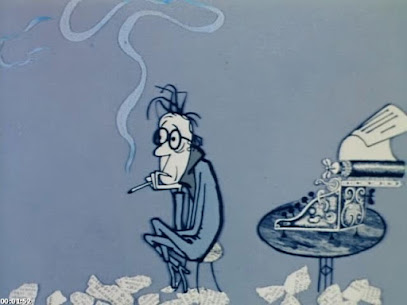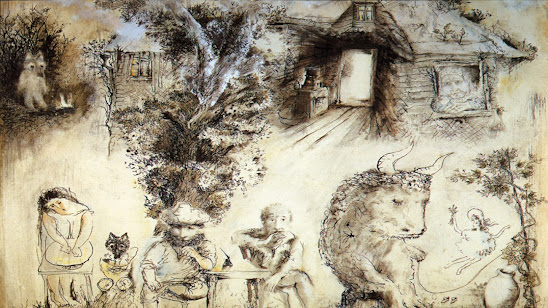“Everything good
is done slowly...the first thing you need to know is how to express
yourself, you have to know how to narrate.” Fyodor Khitruk
Under the
Soviet Union animation was to be standard, monitored, and only for
children. Artists, writers, and cinematographers were censored.
Making films for children however, gave them a certain liberty. Many
artists worked for the state-funded animation studio Soyuzmultfilm.
They used subtleties to critique their society during
times in which they were expected to praise it.
Though, it
wasn't all political. They told stories which neither satisfied nor contradicted society or the scrutinous censorship imposed on them.
They made films that animator Garri Bardin says “talked about
eternal things. Morals, virtue, kindness, faith in something
good...in man himself.” Their work retained Toska: A certain
melancholy of the soul that writer Vladimir Nabokov described
here:
“No single word in English renders all the shades of
toska. At its deepest and most painful, it is a sensation of great
spiritual anguish, often without any specific cause. At less morbid
levels, it is a dull ache of the soul, a longing with nothing to long
for, a sick pining, a vague restlessness, mental throes, yearning."
Through these films we even see
reinterpretations of something so familiar to us as Americans, the
Russian rendition of Winnie the Pooh, who is erratic and clumsy and
full of energy, in a sort of constant frenzy. Or Thumbelina, drawn in
another sense, with different shapes, colors, sensibilities and
movement.
Winnie-Pooh Goes on a Visit (1971)
In Yuri Norstein's Tale of Tales, it attempts to structure itself like a human memory. It neither follows a conventional narrative nor a chronological order. The primary theme of the film is war and its catastrophic losses. There is a scene where loved ones disappear while the music glitches and couples dance during the Tango of the Tired Sun. A dialectic exists within these films, where you can sense sadness in a happy scene, and be left with a smile in a sad one.
Tale of Tales by Yuri Norstein
To explain this “Pushkin Origin” which is a
part of all of his work, Norstein reads this poem:
And both
you and I
Plan a long life
but could abruptly die
the world hasn't happiness,
but there is freedom, peace.
And long have I
daydreamed the life of peace
And we can see this
applied to the emblematic Russian character Cheburashka animated in
stop motion by Roman Kachanov. In a scene where he is praised for not
abandoning his friend Gena the Krokodil, he sits and listens to him
sing and play the accordion:
Slowly minutes are floating away
Don't expect to see them again
And maybe we feel sad that our past is gone
All the best is ahead of us
Everyone should believe and hope for the best
And our blue train is steaming ahead
Maybe we have hurt someone unintentionally
Calendar will turn that page for us
Or perhaps Gena the Krokodil's birthday song would be the perfect way to sum up Toska
Let pedestrians toddle
And the rainwater gurgle
As it streams underneath their feet
Let pedestrians wonder
why this day full of thunder
makes me look so jolly upbeat
If you are interested in watching
Russian animations from the last century, a comprehensive list can be
found in the documentary Magia Russica directed by Masha and Yonathan Zur.
_______________________________________________
Zahra Marwan
is a writer / illustrator of two upcoming books. Where Butterflies Fill the Sky about leaving home, and The Sunflowers about Vincent Van
Gogh's anticipation, friendship and love of color. She grew up in
both Kuwait and New Mexico and currently lives in Albuquerque with
the sweetest Frenchman in the world and their cat who has a really
bad attitude. You can see her work here:
https://zahramarwan.com/
Instagram : zahra_marwan
Twitter: Two_Desert





No comments:
Post a Comment